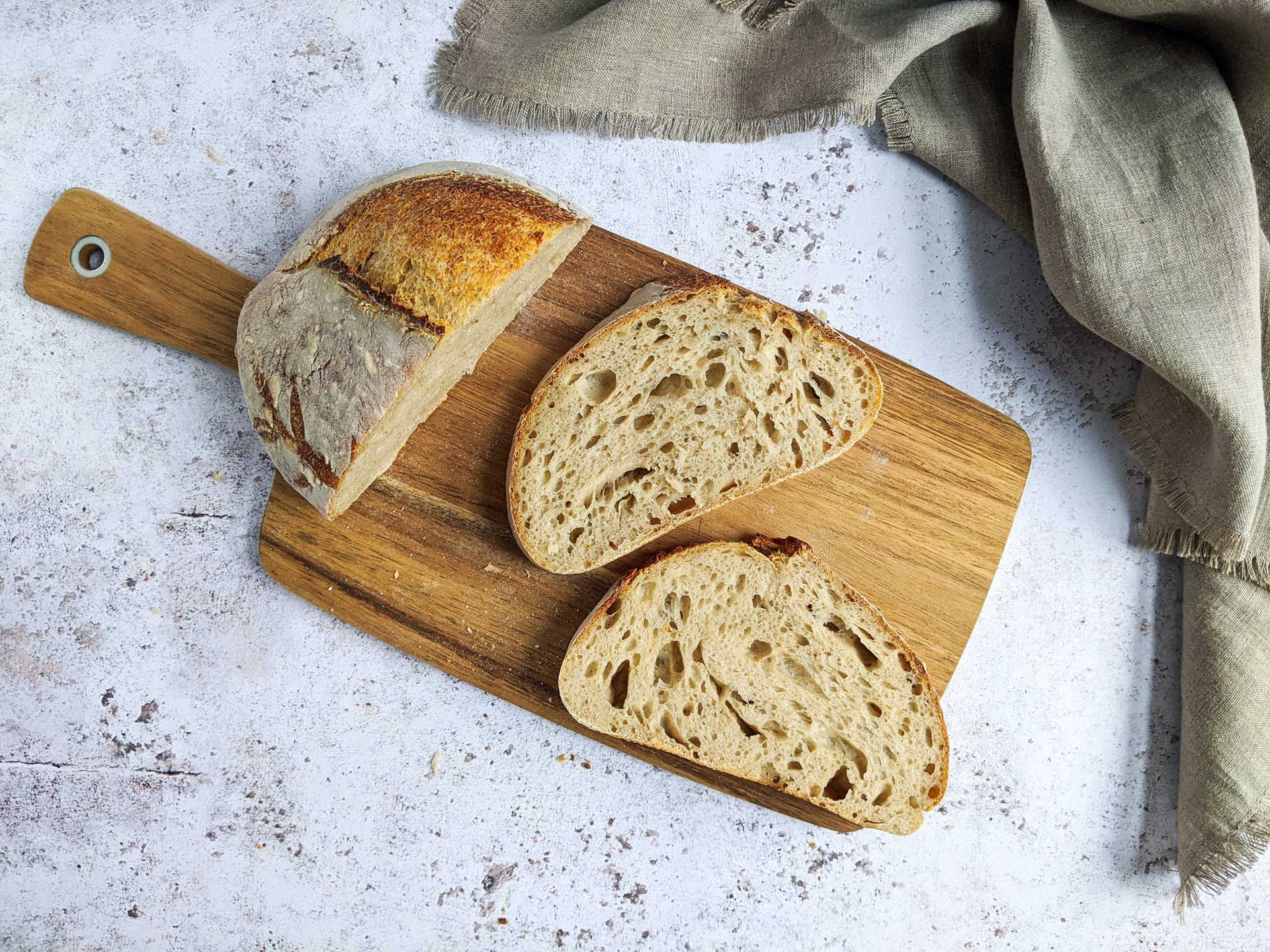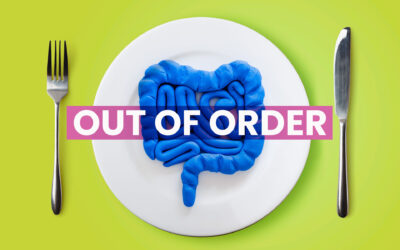Can eating sourdough bread help with your digestion and immune system?
What if that were true? Would you be prepared to include sourdough into your diet to improve diversity?
You may be conditioned to think that bread is bad for you, but we need to look at what sourdough has to offer our health and wellbeing before making such a blanket statement.
Most commercial loaves of bread use baker’s yeast to help the dough rise. But traditional sourdough fermentation happens with a mix of wild yeast, beneficial bacteria, flour, and water. It’s known as a starter and is used to leaven (raise) the bread. This is the start of the process that makes this type of bread so powerfully healthy.
A by-product of the bacteria feeding on the flour during the fermentation process is lactic acid. This gives the bread its sour taste. It also protects the bread from developing mould and other bacteria. You will also find lactic acid in other fermented foods, such as yoghurt, sauerkraut, and kimchi. Foods we know need to be consumed more often to improve our gut health.
Let’s look at why sourdough is so good for you.
Sourdough has a superior nutrition profile
Whether you get your sourdough from the store or make your own, it has a remarkable nutrition profile. Although it can be made from the same whole grain flour as other types of commercial bread, which is packed with nutrients, the fermentation and baking process is what enhances the nutrition profile.
Sourdough made from whole grains contains minerals such as potassium, magnesium, and zinc and vitamins such as folate. The probiotics (beneficial bacteria) that are abundant during the fermentation process significantly decrease the phytic acid present in wheat.
Phytic acid is often referred to as the ‘anti-nutrient’ because it stops the body from absorbing these nutrients. But, the probiotics found in the dough decrease the phytic acid in the wheat flour. This allows the nutrients in the whole grain to break free and become more accessible – so the body can easily absorb them.
The lactic acid bacteria present in sourdough also releases antioxidants during the fermentation process. We all know how good antioxidants are for our wellbeing and immunity.
Once the bread is cooked, all the beneficial bacteria AKA – probiotics – die off… but the advantages gained during fermentation remain.
Sourdough directly improves our immune system
Our gut ecology provides protection against pathogens in two predominant ways. Firstly, the beneficial bacteria compete directly with the bad pathogens for space and nutrients. This means, that if we eat food that promotes beneficial bacteria, it can suppress the growth of bad bacteria by crowding it out.
Secondly, the beneficial bacteria triggers cells in the gut lining to produce antimicrobial substances in the mucus layer of the intestine. This makes it hard for unhealthy pathogens to seep through the gut lining into your bloodstream. If these pathogens cross the intestinal barrier, they can set off our body’s immune response, leading to a low grade and chronic inflammation.
But how does this relate to sourdough?
There are prebiotic features of sourdough found in the non-digestible fibre present – just like Gut Performance™. These prebiotics help feed beneficial bacteria, so they increase in number and diversity. A diverse gut microbiome is positively correlated with a stronger and more supportive immune system. That way, they can do their job – keeping us and our gut happy, healthy and immune.
The immunity benefits don’t stop there. Sourdough is an amazing source of selenium. This is an antioxidant that lowers the oxidative stress and assists in the reduction of inflammation, leading to improved immunity.
Sourdough improves digestion
Bread, in general, is often blamed for bloating, which is uncomfortable and can often cause distress. It’s triggered by the incomplete breakdown of carbohydrates leading to the irritation of the intestinal lining which produces bloating and gas.
However, sourdough is made over a lengthier process compared to the run of the mill sliced bread found in the packaged aisle of the supermarket. This complex process and extended time for fermentation and baking deliver sourdough its benefits.
The fermentation process alters the enzymes in the wheat and pre-digests the flour by consuming its sugar. This means that the food is partially digested before it arrives. Ultimately improving the digestion time and effectiveness.
Also, even though sourdough isn’t gluten-free, it is lower in gluten. Research has also shown that a regular intake of this type of bread may help improve the digestion of gluten (Greco, et al., 2011). The researchers discovered that it helps the gut counteract adverse reactions to people who are sensitive or allergic to gluten.
Sourdough Promotes Healthy Aging
Whole grains, in general, are a staple of the Mediterranean diet. This way of eating has long been considered one of the best anti-aging diets – just google The Blue Zones if you don’t know about this phenomenon. It is believed that the habitual consumption of whole-wheat sourdough bread contributes to the Mediterranean peoples’ lower levels of chronic disease risk (Capurso & Capurso, 2020).
Sourdough Regulates Blood Sugars
Eating carbohydrates in bread is renowned for causing our blood glucose to spike and drop sharply. In the short term, this can lead to a labile mood. In the long term, it increases our risk of chronic diseases like diabetes.
Due to the longer fermentation process, sourdough doesn’t erratically spike the blood sugar because it changes the carbohydrates and produces a resistant starch (carbohydrate). Resistant starches take longer to digest, regulating the amount of glucose entering the bloodstream. It also has lower sugar than standard commercial bread as the yeast and bacteria feed off the sugars during the fermentation process.
Key Takeaways
Sourdough is gaining in popularity, and it’s not just because it tastes good. It is packed with nutrients and is a healthy carb. It is loaded with protein, the right types of fibre, vitamins, minerals, and antioxidants. It can improve digestion, aid immunity and lower your chronic disease risk profile.
If you aren’t into making it yourself, the next time you walk past a bakery, farmers market, or even the supermarket, grab yourself a sourdough instead of your usual loaf. You might be surprised how good it is.

Breadmaking for Real Life, by Vanessa Kimbell
Your Chance to Win a Signed Copy!
This book is a fantastic way to get you started on the sourdough breadmaking road and you could win a copy! All you have to do is…
Go to our recent Instagram post about Sourdough
In the comments, tell us 3 health benefits of sourdough
Simply comment before Friday 5 November 2021 to be in the running.
References
Capurso, A., & Capurso, C. (2020). The Mediterranean way: why elderly people should eat wholewheat sourdough bread – a little-known component of the Mediterranean diet and healthy food for elderly adults. Aging Clin Exp Res, 32, 1-5. Retrieved 2021, from https://doi.org/10.1007/s40520-019-01392-3
Greco, L., Gobbetti, M., Auricchio, R., Di Mase, R., Landolfo, F., Paparo, F., . . . Auricchio, S. (2011). Safety for patients with celiac disease of baked goods made of wheat flour hydrolyzed during food processing. Clinical gastroenterology and hepatology: the official clinical practice journal of the American gastroenterological Association, 9(1), 24-29. Retrieved 2021, from https://doi.org/10.1016/j.cgh.2010.09.025







